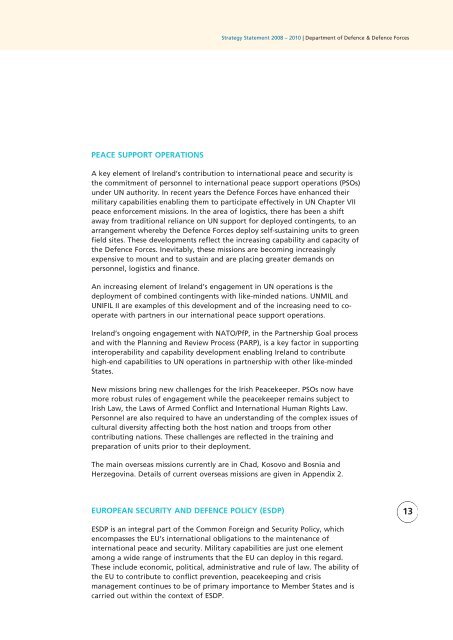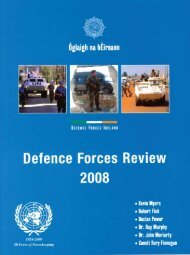Strategy Statement 2008 - 2010 - Department of Defence
Strategy Statement 2008 - 2010 - Department of Defence
Strategy Statement 2008 - 2010 - Department of Defence
Create successful ePaper yourself
Turn your PDF publications into a flip-book with our unique Google optimized e-Paper software.
<strong>Strategy</strong> <strong>Statement</strong> <strong>2008</strong> – <strong>2010</strong> | <strong>Department</strong> <strong>of</strong> <strong>Defence</strong> & <strong>Defence</strong> Forces<br />
PEACE SUPPORT OPERATIONS<br />
A key element <strong>of</strong> Ireland’s contribution to international peace and security is<br />
the commitment <strong>of</strong> personnel to international peace support operations (PSOs)<br />
under UN authority. In recent years the <strong>Defence</strong> Forces have enhanced their<br />
military capabilities enabling them to participate effectively in UN Chapter VII<br />
peace enforcement missions. In the area <strong>of</strong> logistics, there has been a shift<br />
away from traditional reliance on UN support for deployed contingents, to an<br />
arrangement whereby the <strong>Defence</strong> Forces deploy self-sustaining units to green<br />
field sites. These developments reflect the increasing capability and capacity <strong>of</strong><br />
the <strong>Defence</strong> Forces. Inevitably, these missions are becoming increasingly<br />
expensive to mount and to sustain and are placing greater demands on<br />
personnel, logistics and finance.<br />
An increasing element <strong>of</strong> Ireland’s engagement in UN operations is the<br />
deployment <strong>of</strong> combined contingents with like-minded nations. UNMIL and<br />
UNIFIL II are examples <strong>of</strong> this development and <strong>of</strong> the increasing need to cooperate<br />
with partners in our international peace support operations.<br />
Ireland’s ongoing engagement with NATO/PfP, in the Partnership Goal process<br />
and with the Planning and Review Process (PARP), is a key factor in supporting<br />
interoperability and capability development enabling Ireland to contribute<br />
high-end capabilities to UN operations in partnership with other like-minded<br />
States.<br />
New missions bring new challenges for the Irish Peacekeeper. PSOs now have<br />
more robust rules <strong>of</strong> engagement while the peacekeeper remains subject to<br />
Irish Law, the Laws <strong>of</strong> Armed Conflict and International Human Rights Law.<br />
Personnel are also required to have an understanding <strong>of</strong> the complex issues <strong>of</strong><br />
cultural diversity affecting both the host nation and troops from other<br />
contributing nations. These challenges are reflected in the training and<br />
preparation <strong>of</strong> units prior to their deployment.<br />
The main overseas missions currently are in Chad, Kosovo and Bosnia and<br />
Herzegovina. Details <strong>of</strong> current overseas missions are given in Appendix 2.<br />
EUROPEAN SECURITY AND DEFENCE POLICY (ESDP)<br />
13<br />
ESDP is an integral part <strong>of</strong> the Common Foreign and Security Policy, which<br />
encompasses the EU’s international obligations to the maintenance <strong>of</strong><br />
international peace and security. Military capabilities are just one element<br />
among a wide range <strong>of</strong> instruments that the EU can deploy in this regard.<br />
These include economic, political, administrative and rule <strong>of</strong> law. The ability <strong>of</strong><br />
the EU to contribute to conflict prevention, peacekeeping and crisis<br />
management continues to be <strong>of</strong> primary importance to Member States and is<br />
carried out within the context <strong>of</strong> ESDP.
















